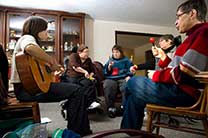Although owning a home will usually provide greater stability and financial security, in some situations, renting may be advantageous, at least initially.
Then, if you decide against renting or are ready to move out of a rented facility into a home, the first decision is who will actually own the home. There are several options with advantages and disadvantages to each.
Renting
| Advantages | Disadvantages |
|---|---|
|
|
Considerations When Renting
- Know how involved the landlord needs to be regarding support services and needs.
- Renter’s insurance needs to be figured into the monthly costs.
- The lease agreement, building rules, and restrictions must be understood by all parties.
Home Ownership
Be sure to discuss all ownership options with all interested parties, including your lawyer.
Occupant-Owned
Owning a home of one’s own is widely considered to be the most secure option and the best financial investment. You might assume that home ownership is not an option for your child because his or her government benefits will be at risk. This is not necessarily true. SSI and Medicaid, for instance, do not consider a home that an individual lives in as a countable asset when determining eligibility. You may also assume that if your child has a low income, he or she cannot afford to purchase a home. Nevertheless, some programs make home ownership possible for people with modest incomes.
| Advantages | Disadvantages |
|---|---|
|
|
Considerations Before Your Child Purchases a Home
Guardians:
If your child has a court-appointed guardian, there may be some road blocks to home ownership. Typically, a person with a legally appointed guardian can own a home, but the guardian would be responsible for managing it, thus minimizing the owner’s control. Additionally, a guardian may need approval from the probate court, such as for selling the property or making major renovations. The rules concerning guardianship vary, and specific court processes are up to each county probate court. Specific rules and procedures are available at a county probate court or from an attorney.
Ways Ownership Can Affect Benefits:
- Charging Rent: Collecting rent to cover expenses in the home in which one lives is not usually considered taxable income. However, if the amount of rent being collected exceeds the actual expenses by a large amount, it could be subject to income tax. This income could affect benefits. Consult a tax professional before charging rent.
- Selling/Moving: If the home is sold, any gain may be taxable and will be considered a capital resource impacting government benefits. Similarly, if the homeowner has to move into a different setting, such as a nursing home, the house can be considered a countable resource impacting eligibility for SSI and Medicaid.
- Saving for Repairs: Saving up large amounts of money for renovations or repairs could also affect government benefits. Note: This may be offset by creating a capital reserve account or escrow account with the mortgage company.
Parent or Relative Owned
If you, as the parent, are more financially secure than your child, it may seem best for you to purchase the home.
| Advantages | Disadvantages |
|---|---|
|
|
Considerations for Parent or Relative Ownership
Assets:
The house is an asset for the owner. It’s at risk in the event of lawsuits, divorce, bankruptcy, etc. It also applies toward need-based benefits, such as Medicaid.
Rent:
Rent received from the residents is taxable income for the owner. A tax professional should be consulted.
Contracts:
A written agreement about expenses (repairs, taxes, and so on) is essential, especially if only one parent or family member owns the home and other occupants are renting. (Example: Who is responsible for accessibility renovations?)
Other Options for Home Ownership
Other home ownership options to discuss with an attorney chosen by your family are:
- Joint Ownership
- Trust Ownership
- Corporate Ownership













